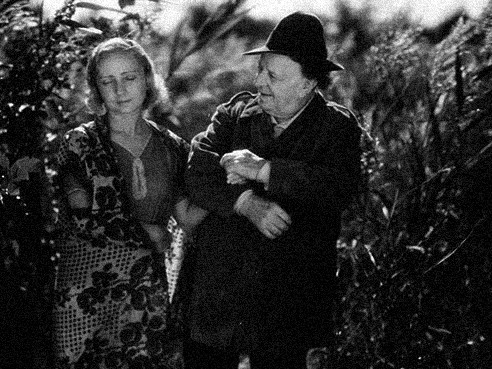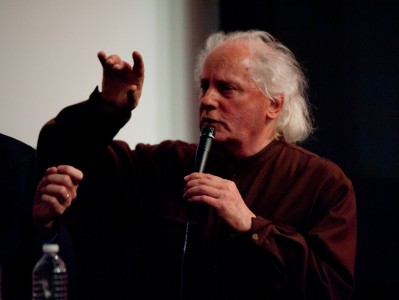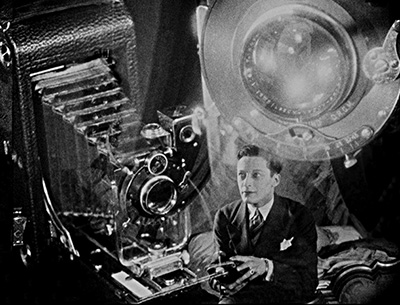
Beggar's Heart (Coeur de gueux) introduction by David Pendleton and Sarah Keller.
Transcript
John Quackenbush 0:00
February 27, 2016. The Harvard Film Archive screened Beggar's Heart. This is the audio recording of the introduction by HFA programmer David Pendleton and film historian Sara Keller.
David Pendleton 0:14
[INITIAL AUDIO MISSING] ...adventurous cinephiles, we have a true rarity. And a real treat, I think, for you this evening, in Coeur de gueux, Beggars Heart, by Jean Epstein—is it Epstein, "Epsteen"? Epstein—who was born in Poland, but made films in France in the 1920s through the late 1940s. Especially known for his silent work. But what we're going to see tonight is one of his sound films, as a director for hire, that he made in between various documentaries that he was commissioned to make, and the films made in Brittany that I think were really where his heart was, at this point, after his first trip there at the end of the 1920s, for his last silent film, called Finis Terrae, which we'll be showing on Monday evening. I encourage you to come back for that. It's one of the only films that we're presenting digitally, because there's been a restoration but there are no prints of the restoration. So we have a fine digital copy. Tonight, I'm happy to say we do have a nice 35. I should also point out that on Monday evening, the film will be accompanied by Bertrand and Susan Laurence, who were here last night, for those of you who saw the The Lion of the Moguls, so that's a treat as well.
I guess there's not much else I need to say except the usual. Thanks to the Cinémathèque Français. This is a print of theirs. And, as well as to Kathy Geritz at the Pacific Film Archive, and the Consulate General of France in Boston. Make sure all your devices are off. And finally, I should also mention, we have a couple of changes to the schedule next week, because they are related to this period in Epstein's career in the mid-1930s. If you were here at seven, you heard me say that we won't be showing La Belle Nivernaise next Friday evening, unfortunately. We were unable to get a print, after all. We'll be showing The Man in the Hispano Car, which is another one of these films from the 1930s, a light entertainment that Epstein made for hire. And then the final program, one week from tonight, right around now, nine o'clock, one week from tonight, the prints will be presented without subtitles. As it turns out, there are no subtitles that exist for these films. So brush up on your French.
And now it's my pleasure to introduce, once again, Sara Keller, one of the leading experts on Epstein, co-editor of an anthology both of writings both by Epstein and about Epstein, and a professor at the University of Massachusetts of Boston. So we're lucky we have her here, local, to come, when she gets a chance, from her busy schedule, and tell us more about Jean Epstein. So I'll leave her now to introduce Coeur de gueux.
[APPLAUSE]
Sarah Keller 1:33
Thank you. Okay, great. Thanks again, David, I have just a few things that I want to say about the film that you're about to see, which is one of my favorites. It's a very sentimental sort of film. So maybe you will think less of me after that. But it has, very much like Mauprat, if you were here for that film just now, it really weds the narrative demands of the story that it's telling—which is in the vein of melodrama—with a real spirit of experimentation, and a visual experimentation, in particular. In this case, we also have an example of Epstein's experiments with film sound. The Man with the Hispano Car, which I'm so glad to hear is going to be joining the program also—although it is a film for hire, something that he did for money, and for work—it has amazing sound sequences that overlap sound, and experiment with the way that sound might tell a different story than the thing that you're looking at. So you might just attend to that tonight. The other thing about this film that I am a sucker for a beautiful visual image. And this film is lit so beautifully, and there are so many long tracking shots that sort of seem to float over the landscape, that it's really quite beautiful to look at, whatever else might be happening. It tells a very usual sentimental story, and it features a well-known French actress, Madeleine Renaud, who is wonderful in it. But the thing that really strikes me most about the film is this sort of merger between the melodramatic story that it wants to tell and the way that it's playing with the visual. So I hope that you'll enjoy it as much as I do. Thanks.
[APPLAUSE]
© Harvard Film Archive
Related film series
Explore more conversations
Nelson Pereira dos Santos

Lee Jang-ho

Paolo Gioli

Laura Citarella

